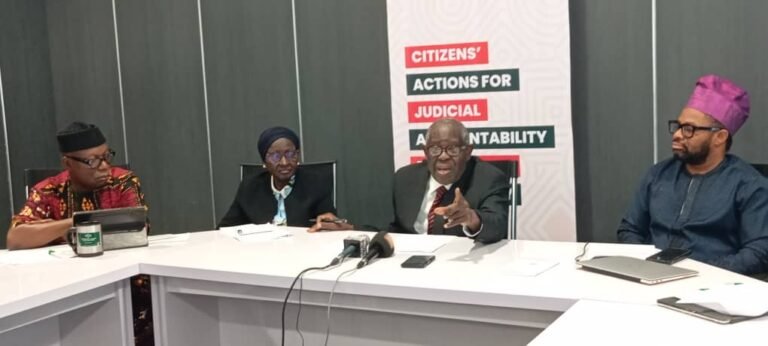Ahead of the 2027 general election, the Independent Judicial Accountability Panel (IJAP) and the ActionAid Nigeria (AAN) have urged the nation’s judiciary to consider the merits of electoral petitions and not technicalities to deepen democracy and rule of law in the country.
The panel also urged the Independent National Electoral Commission (INEC) to adhere strictly to the provisions of the Constitution, the Electoral Act, and its regulations on the nomination of candidates in order to safeguard public trust and prevent needless electoral litigations.
The IJAP, led by retired Court of Appeal, Justice Adekunle Owoade, also charged political parties to prioritise the public interest over selfish ambitions, abide by their constitutions, rules, and regulations in candidate nominations, and desist from exerting undue pressure on INEC and the courts.
Addressing a press conference at the end of IJAP’s third session, held under the auspices of the Citizen-Led Engagement on Judicial Accountability in Post-Election Justice Delivery in Nigeria (CLEAP-Act), supported by ActionAid Nigeria, Owoade said it was important for the citizens to actively engage in the electoral process, including party primaries, and to reject candidates who do not emerge from lawful primaries.
Among the panel’s cited cases was a review of high-profile Supreme Court cases, including APC v. Bashir Sheriff & INEC and Oyetola v. INEC, which the panel said raised serious concerns about consistency with established legal principles.
In the Bashir Sheriff case, IJAP criticised the Supreme Court’s reliance on technicalities, arguing that it contradicted its own precedents and undermined substantial justice.
“The judiciary must place greater emphasis on justice rather than technical interpretations that can subvert the will of the people,” Justice Owoade said.
On Oyetola v. INEC, the panel commended the court for its clarity on the use of the Bimodal Voter Accreditation System (BVAS), but stressed that backend data alone should not serve as conclusive evidence in election disputes.
In its analysis of Rhodes-Vivour v. INEC, IJAP welcomed the Supreme Court’s reaffirmation that a dual citizen by birth is not disqualified from contesting elections, describing it as a reasonable interpretation of constitutional provisions.
“Citizens must show greater interest in the entire electoral process, including party primaries, and reject candidates that emerge through flawed processes. The judiciary, INEC, political parties, and the legislature all have roles to play in building trust in our democracy, Justice Owoade said while calling for urgent reforms in Nigeria’s judicial and electoral systems.
The panel also discussed the recent emergency rule in Rivers State, noting that while democratic governance had been restored, the process revealed constitutional ambiguities.
It noted that the National Assembly confirmed the declaration of emergency through a voice vote rather than the constitutionally required roll-call vote, potentially undermining democratic provisions.
It expressed concern that a pending legal action seeking clarity on the President’s emergency powers under Section 305 of the Constitution remains unheard at the Supreme Court, saying “This delay undermines public confidence in the judiciary’s role as a guardian of constitutionalism” urging expedited hearings for cases of national importance.

